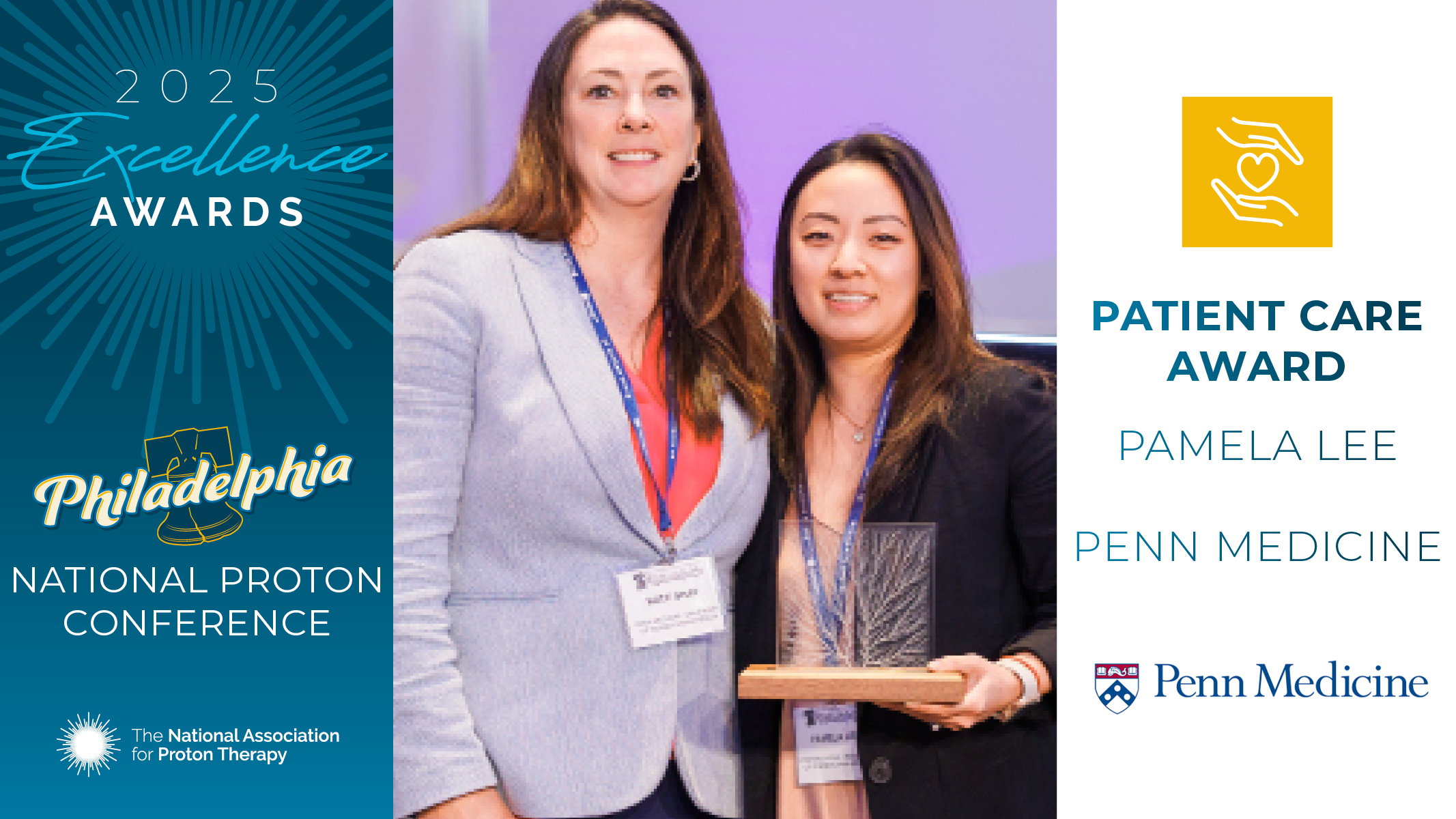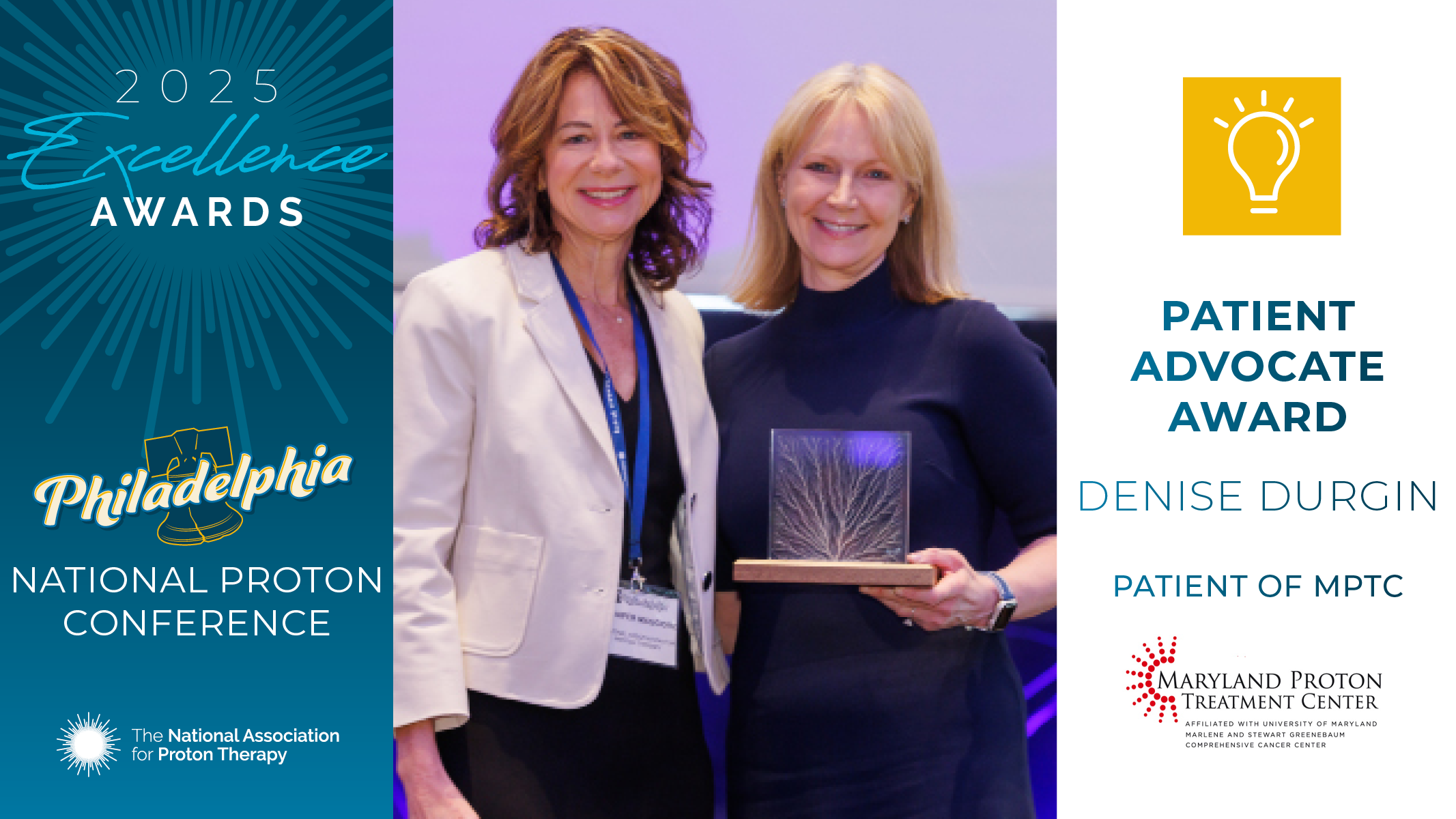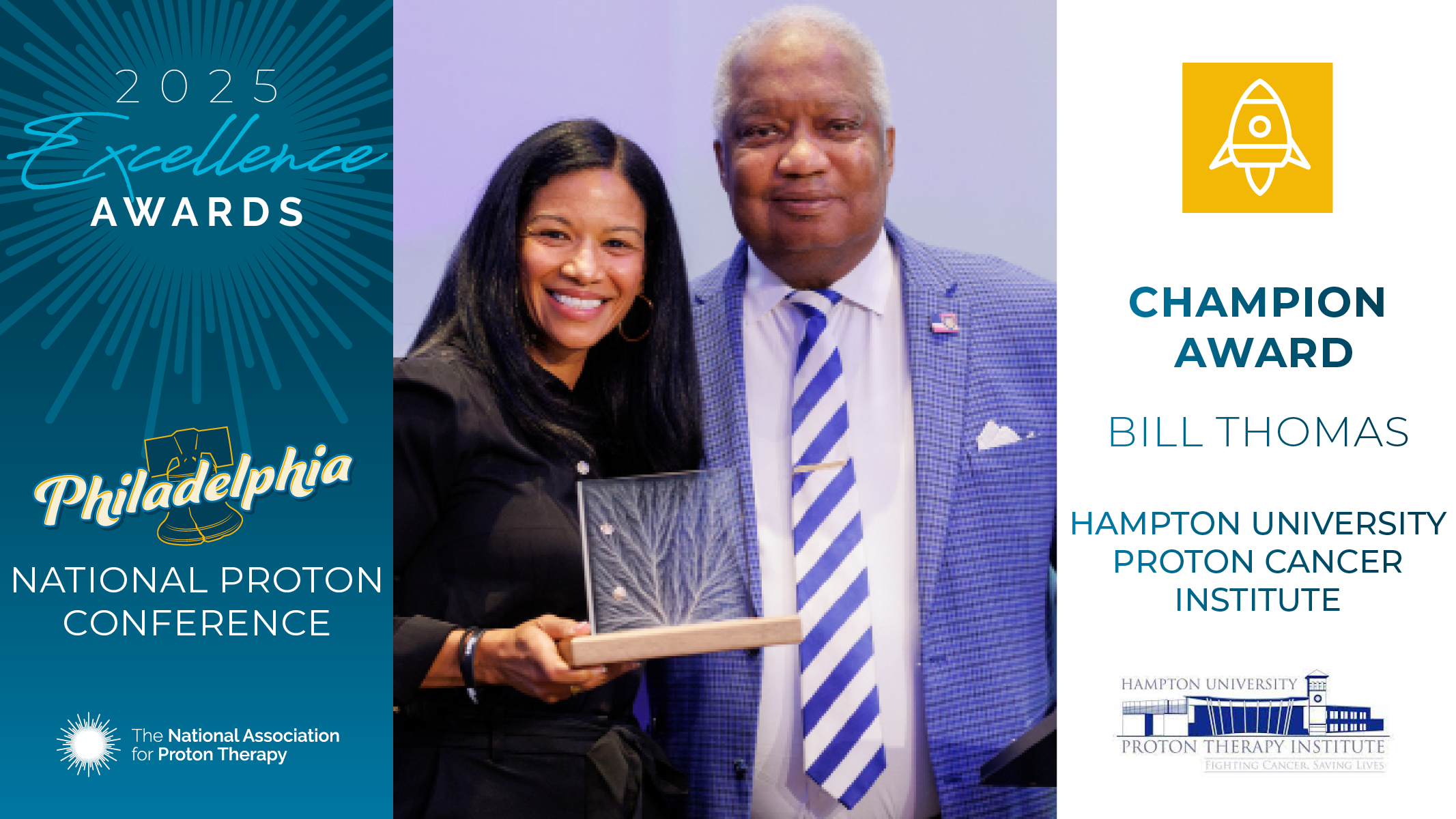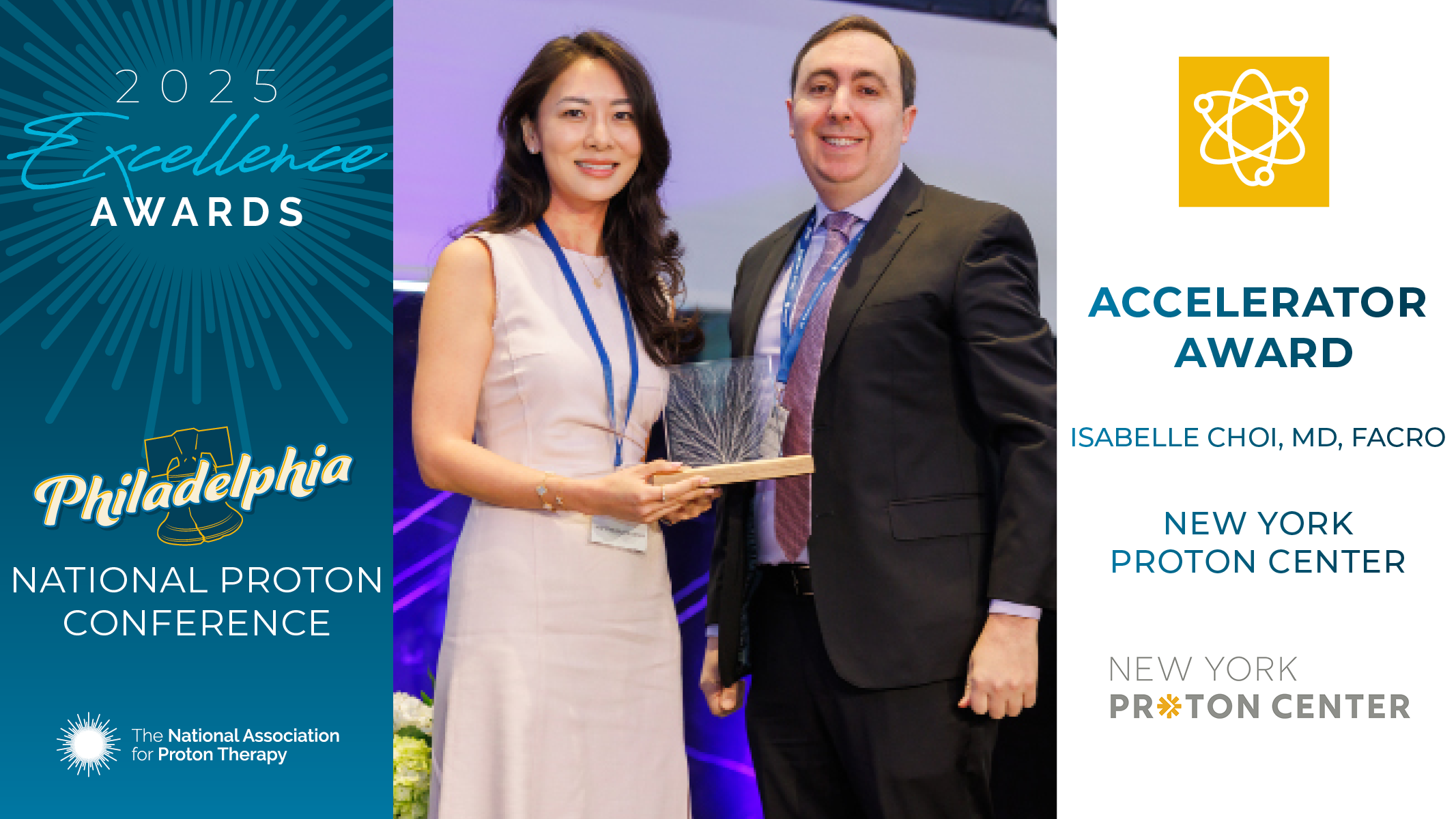NAPT celebrates excellence and innovation across various fields, recognizing outstanding individuals and organizations who advance the science and patient access to proton therapy, effectively advocate for improved patient access, and shine a light on the positive outcomes achieved by this life-saving, life-changing treatment. Join us in honoring these winners who have made remarkable contributions in proton therapy.
Accelerator Award for Clinical Achievement
The Accelerator Award for Clinical Achievement honors exceptional clinicians who demonstrate leadership in proton therapy. Awardees are distinguished for their clinical excellence, pivotal role in advancing patient access and outcomes, and efforts to make proton therapy more accessible.
2025 WINNER

Isabelle Choi, MD, FASTRO
Dr. Isabelle Choi is a leading radiation oncologist at the New York Proton Center, known for advancing proton therapy through research, innovation, and patient care. She has driven numerous clinical trials and education initiatives, helping expand proton therapy’s role in cancer treatment. Dr. Choi’s commitment to research excellence and multidisciplinary collaboration continues to push the field forward. In addition to her clinical and academic leadership, Dr. Choi serves as co-chair of the NAPT Physician Advisory Committee.
Patient Advocate Award
The Patient Advocate Award celebrates individuals who, often drawing from their personal journeys, tirelessly promote proton therapy. They are advocates for the therapy, striving to enhance awareness and access for patients to this transformative cancer treatment.
2025 WINNER

Denise Durgin
Denise Durgin, a proton therapy patient at the Maryland Proton Treatment Center, turned her experience into advocacy by authoring Prescription for Proton Therapy. Through writing, public speaking, and Capitol Hill outreach, Denise educates patients and policymakers on the benefits of proton therapy and the need for equitable access, making her a powerful voice in the community.
Patient Care Award
The Patient Care Award is given to caregivers in the proton therapy community who demonstrate outstanding commitment to supporting patients and families. This award celebrates those who ensure a compassionate, comprehensive treatment experience, coordinating care that addresses the unique needs of each patient.
2025 WINNER
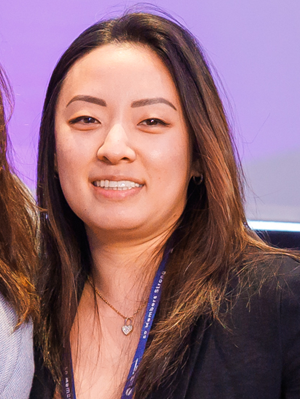
Pamela Lee
Pamela Lee, a leader at Penn Medicine’s proton therapy program, is recognized for her outstanding commitment to patient-centered care. Known for her compassionate support and clinical excellence, she ensures that every patient receives personalized guidance and treatment, making a lasting difference in the lives of those undergoing proton therapy.
Champion Award
The Champion Award is reserved for individuals who have demonstrated a strong commitment to advocating for proton therapy access through legislative and regulatory efforts. Awardees are recognized for their leadership in promoting policies that ensure patients have access to advanced radiotherapy treatments.
2025 WINNER
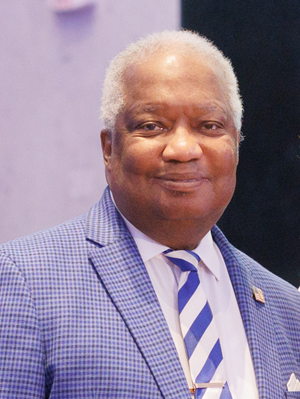
Bill Thomas
Bill Thomas, Associate Vice President at Hampton University , has led major legislative efforts to improve patient access to proton therapy in Virginia. His advocacy helped secure vital policy changes, and his public engagement, including a 14,000-person rally, has strengthened awareness and support for proton therapy as a life-saving treatment option for patients of Hampton University Proton Cancer Institute (Hampton Proton) and across the country.

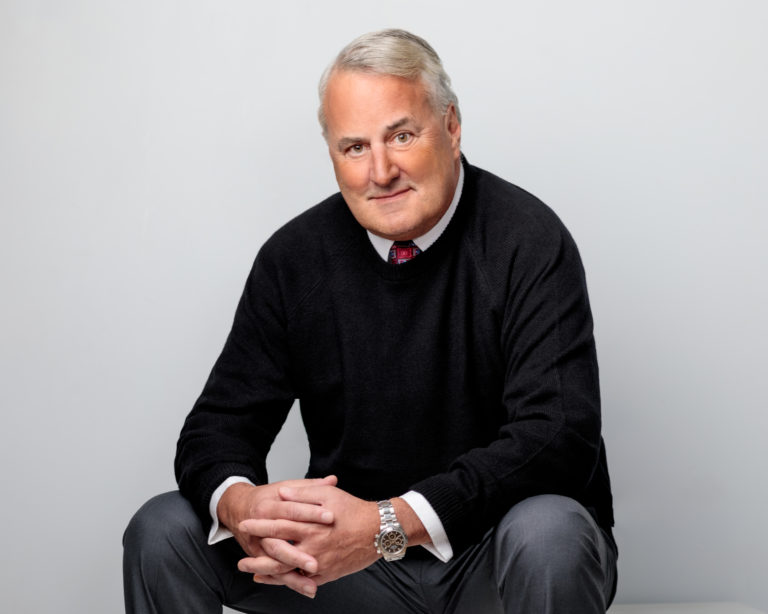
2022 Lifetime Achievement Award Winner:
Dr. Jay S. Loeffler
Dr. Loeffler’s unparalleled expertise in treating brain and central nervous system tumors, along with his pioneering work in stereotactic radiotherapy, has left an indelible mark on the discipline. His extensive career reflects his commitment to advancing radiation oncology and mentoring the next generation of professionals.
In recognition of his pioneering work in the field of proton therapy, Dr. Jay Loeffler, physician, and clinical researcher, has been awarded the National Association for Proton Therapy’s 2022 Lifetime Achievement Award. Dr. Loeffler is a world leader with unparalleled experience in the treatment of brain and central nervous system (CNS) tumors and the use of stereotactic radiotherapy. His research, treatment methods and expertise have significantly contributed to the field of proton therapy.
Dr. Loeffler completed his Residency Program in Radiation Oncology at Harvard Medical School in Boston, Massachusetts. He joined the faculty of Joint Center for Radiation Therapy, Department of Radiation Therapy, Harvard Medical School as an instructor and progressed in the academic ranks to be promoted as the Andres Soriano Professor of Radiation Oncology, Harvard Medical School in 2000. He is devoted to educating and mentoring the next generation of Radiation Oncologists.
Dr. Dennis Shrieve of University of Utah at Huntsman Cancer Institute states, “Dr. Jay Loeffler has devoted his professional life to the advancement of radiotherapy with the dual role of improving tumor control and limiting normal tissue toxicity. Under his leadership, proton therapy has become available to ever more patients worldwide. He is a passionate advocate for radiotherapy in general and proton therapy in particular”
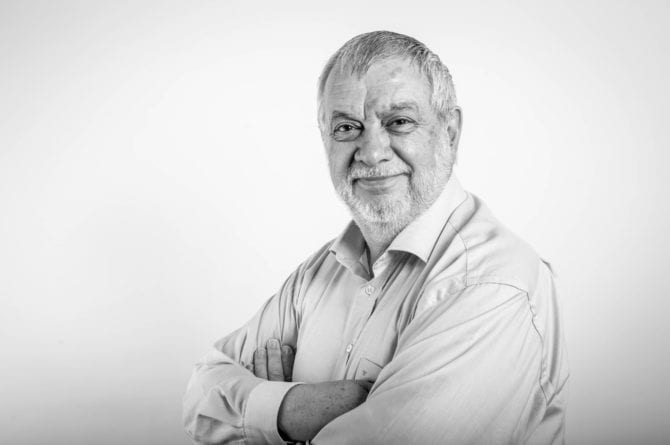
2021 Lifetime Achievement Award Winner:
Yves Jongen
Jongen’s work has been instrumental in advancing the capabilities of proton therapy technology, making it more accessible and effective in treating various types of cancer. His expertise and leadership have contributed to the growth of proton therapy as a valuable tool in the fight against cancer.
Mr. Jongen founded IBA with the vision to advance particle therapy by inventing and developing a cyclotron particle accelerator, which could accelerate charged particles up to half the speed of light through a magnetic field. His vision and dedication were rewarded in 1994 when Massachusetts General Hospital commissioned IBA’s first cyclotron for proton therapy. This resulted in MGH treating its first patient in 2001 with IBA Proteus®, the first commercially available proton therapy system.
Convinced that cost was the largest impediment to making proton therapy available to more patients, Yves focused his attention on the development of a compact, energy-efficient proton therapy system, resulting in the development of a single room solution for IBA that dramatically reduced the total project cost associated with establishing a proton therapy center.
Dr. Nancy Mendenhall of the University of Florida Health Proton Therapy Institute states, “It would be difficult to think of anyone living who has been passionately interested in particle therapy longer than Yves. From his work in electrical engineering and physics in his early career and his early recognition of the potential value of protons for cancer treatment, Yves has worked tirelessly and creatively to develop technology to deliver proton therapy safely, effectively, and as inexpensively as possible”
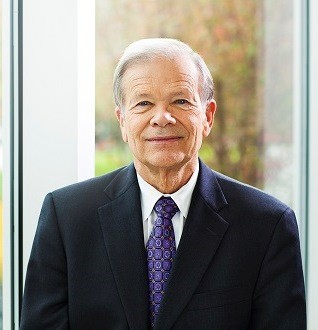
2019 Lifetime Achievement Award Winner:
Dr. George Laramore
“I have spent most of my professional life working with particle radiation of one form or another. While not appropriate for every cancer patient, it is clear to me that there are many patients who can be best served by proton therapy. I am so grateful I have been able to help make this treatment available to them.”
Dr. Laramore’s vision that particle therapy would be at the forefront of the future of radiation therapy has been instrumental to the development of the field as it exists today. His vision combined with his steadfast perseverance to make particle therapy available in the Pacific Northwestern United States has and continues to benefit thousands of cancer patients every year.
In addition to his vision and perseverance, his extraordinary and extensive leadership in the field of Head and Neck Cancer research has been paramount in assuring the best outcomes for cancer patients facing this diagnosis.
Dr. Laramore dedicated much of his career to training Radiation Oncologists who are now delivering radiation therapy to cancer patients throughout the country and the world. His vision and legacy will continue on through them and, in turn, the physicians they train to treat patients with particle therapy.
Upon learning he had received the NAPT Lifetime Achievement Award, Dr. Laramore stated “I am overwhelmed by NAPT giving me this award, particularly in view of the outstanding Radiation Oncologists who have previously received it. I have spent most of my professional life working with particle radiation of one form or another. While not appropriate for every cancer patient, it is clear to me that there are many patients who can be best served by proton therapy. I am so grateful I have been able to help make this treatment available to them.”
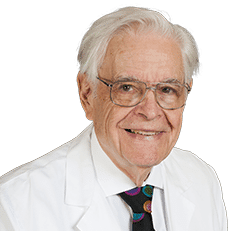
2018 Lifetime Achievement Award Winner:
Dr. Herman Suit
“Being a physician and having an opportunity to treat patients that we can cure, and that couldn’t be cured otherwise without horrendous surgery, is one of the nicest experiences a human being can have. I know that now I see patients that I’ve treated 25, 28 and 29 years ago, and to see those people come back and know what was recommended for them before we treated them, and looking just splendidly is just great.”
Dr. Herman Suit commenced his medical practice during the nascent stages of radiation oncology and emerged as a pivotal figure in advancing proton therapy into a potent and widely adopted tool for cancer treatment.
Before delving into proton therapy, Dr. Suit achieved academic milestones, obtaining his M.S. and MD degrees from Baylor University and embarking on medical school at the youthful age of 19. His scholarly journey took him to Oxford University, where he conducted research on human bone marrow cellularity and its response to radiation. Upon returning to the United States, Dr. Suit distinguished himself as one of a select group of radiation oncologists in the country, practicing at MD Anderson Cancer Center in Houston. There, he revolutionized the treatment approach for soft tissue sarcomas by pioneering the use of radiation in conjunction with conservative surgery, challenging the prevailing practice of amputation during that era.
Relocating to Boston, Dr. Suit assumed the inaugural role of Chair of Radiation Oncology at Massachusetts General Hospital. During his tenure, he made significant contributions to the nascent field of proton therapy, playing a crucial role in treating some of its earliest patients. This groundbreaking work received vital support through a research grant from the National Cancer Institute in 1972, a grant that continues to drive research to this day. This early research was seminal in establishing proton therapy as a mainstream medical modality.
Dr. Suit’s notable achievements encompass innovative approaches to preserving limbs in sarcoma patients and employing proton therapy for treating spine, sacral, and skull base tumors. His extensive contributions to the field were further acknowledged through prominent leadership roles, including serving as president of the American Society of Therapeutic Radiation Oncology and president of the Radiation Research Society. His remarkable career has been punctuated by numerous accolades, notably the Gold Medal from the American Society of Therapeutic Radiation Oncology and American College of Radiology, the Sloan Award for exemplary clinical research, and being twice honored with inclusion in “the one hundred” award from the Mass General Cancer Center. In 2017, Dr. Suit was honored as a Giant of Cancer Care in the Radiation Oncology Category by OneLive.
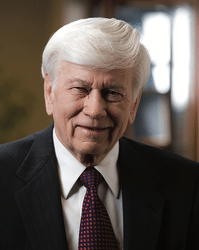
2017 Lifetime Achievement Award Winner:
Dr. James M. Slater
Dr. Slater’s enduring legacy in the field of radiation medicine has directly benefited thousands of patients. His leadership in the routine clinical application of proton radiation, coupled with a lifetime of service driven by a commitment to the well-being of others, stands as a testament to the highest ideals of the medical profession.
Dr. James M. Slater has devoted his entire professional career to advancing and optimizing proton therapy—a journey that began with the establishment of the world’s inaugural hospital-based proton treatment center at Loma Linda University Medical Center (LLUMC) in 1990. While his pioneering role in this historic milestone is well-recognized, Dr. Slater’s extensive efforts before and after this momentous event have significantly enhanced the efficacy of proton therapy for patients.
In the mid-1960s, during his tenure as a radiation oncology resident, Dr. Slater became disheartened by the prevalent side effects associated with conventional radiotherapy. He was determined to reduce the unnecessary radiation exposure endured by patients. Drawing on his prior aspirations to be a physicist, he discerned the potential of heavy charged particles, particularly protons, in minimizing these side effects—a concept being explored in physics research laboratories at the time.
Throughout the 1970s and early 1980s, Dr. Slater conducted thorough investigations into various heavy-charged-particle radiation therapy modalities. Gradually, he identified protons as the optimal choice for routine radiation oncology. By the mid-1980s, he began advocating for the establishment of a hospital-based proton treatment center. His efforts culminated in a collaboration between LLUMC and Fermilab, leading to the development of a dedicated proton synchrotron and delivery system for patient treatment.
Dr. Slater’s commitment to advancing proton therapy extended far beyond the inauguration of the first hospital-based center in 1990. Recognizing the critical role of ongoing research in enhancing proton therapy, he spearheaded initiatives to expand proton therapy research. These endeavors resulted in the inclusion of additional anatomical sites for proton treatment and the implementation of innovative protocols such as hypofractionation and combination regimens.
The true measure of Dr. Slater’s impact lies in the tangible benefits experienced by patients. Expressions of gratitude from patients, acknowledging the exceptional care and compassion they received, reflect his unwavering commitment. This gratitude found a tangible form in the establishment of the Brotherhood of the Balloon (BOB), an advocacy organization that honored Dr. Slater by establishing an academic chair in his name at LLU. In further recognition of his contributions, LLUMC renamed its proton facility the James M. Slater, MD, Proton Treatment and Research Center in 2007.
Dr. Slater’s enduring legacy in the field of radiation medicine has directly benefited thousands of patients. His leadership in the routine clinical application of proton radiation, coupled with a lifetime of service driven by a commitment to the well-being of others, stands as a testament to the highest ideals of the medical profession.
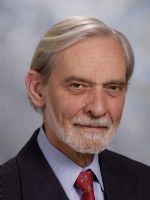
2017 Lifetime Achievement Award Winner:
Dr. James Cox
“Our goal from the very beginning was to try to expand proton therapy into all disease sites where protons might have some benefit,” Cox said in an interview at an ASTRO conference in 2011. “The rapid technologic advances and the way they help our patients is truly gratifying and fun, with protons being one of the most recent ones. We are only at the beginning of wedding these advances with molecular targeted agents, so there is much excitement in the future.”
Dr. James Cox learned from the masters in the development of radiation as a therapy option for cancer. He went on to become a master himself.
Dr. Cox, a professor emeritus in the Department of Radiation Oncology at the University of Texas MD Anderson Cancer in Houston, brought proton therapy to this world-renowned institution—helping propel the modality into the mainstream. Serving in a variety of capacities at the center, he pioneered ground-breaking research demonstrating proton therapy’s effectiveness for treating a variety of cancers.
Dr. Cox entered the field of radiation oncology in its nascent stages, training under pioneers in the U.S. and Europe including Juan del Regato, Andrée Dutreix, Bernard Pierquin and Jack Maier. After his training, a stint in the military during the Vietnam War and time at Medical College of Wisconsin and Columbia Presbyterian Medical Center, he landed at MD Anderson. First he served as physician in chief and then as head of the radiation oncology division, where he significantly expanded MD Anderson’s cancer treatment program and capabilities.
Introduced to protons in the late 1980s, Dr. Cox was initially not a supporter of the treatment but later stated, “I must admit my shortsightedness, that I didn’t see any particular value for proton therapy.” He ultimately recognized proton therapy as the “natural evolution” of radiation therapy and worked hard to establish a center at MD Anderson. The center began treating patients in 2006.
“Our goal from the very beginning was to try to expand proton therapy into all disease sites where protons might have some benefit,” Cox said in an interview at an ASTRO conference in 2011. “The rapid technologic advances and the way they help our patients is truly gratifying and fun, with protons being one of the most recent ones. We are only at the beginning of wedding these advances with molecular targeted agents, so there is much excitement in the future.”
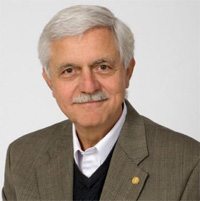
2016 Lifetime Achievement Award Winner:
Bob Marckini
“I want people to be informed about Proton Therapy and not to have to go through what I did to find out about it.”
Bob Marckini hasn’t spent hours with his eye to a microscope, calculated a single proton therapy dosage or reviewed one patient’s CT scan. But patient advocacy has played as important role as medical research in the expansion of proton therapy—and there he has made no small contribution.
After watching his brother suffer the side effects of prostate cancer, Marckini determined to find an alternative to surgical treatment when he received his own diagnosis a few years later. A high-powered, Fortune 500 executive, he did not take the task lightly. He interviewed some 50 prostate cancer survivors and took it upon himself to learn the pros and cons of each therapy alternative. He ultimately decided that proton beam radiation therapy was the best option for him.
He was treated with proton therapy at Loma Linda University Medical Center—the nation’s first proton therapy clinical center—and emerged its evangelist. “We were blown away,” said Marckini of his initial visit to Loma Linda in an interview with Proton Therapy Today. “And I made my decision right there to get proton therapy treatment.”
After his treatments were complete, Bob and a few fellow patients formed a group in order to stay in touch. With Bob’s leadership that group ultimately evolved into one of the largest prostate cancer patient advocacy organizations in the world, the Brotherhood of the Balloon (or BOB). The organization provides support to prostate cancer patients around the world while raising money for cancer research. The group has grown from just a few members when it started to now over 10,000 members and continues to grow.
In addition to forming the Brotherhood of the Balloon, Bob later wrote what is still one of the most read books on treatment for prostate cancer. Bob shared that he wrote the book to remove the mystery, confusion, and fear about what to do when you are diagnosed with prostate cancer. In the book, he makes a strong case for proton therapy as a viable option to surgery and other treatment options that often result in debilitating side effects.
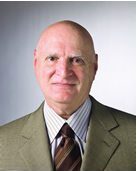
2015 Lifetime Achievement Award Winner:
Len Arzt
“My biggest success was founding the NAPT. My second, equally important success, was educating thousands of patients about the advantages of proton therapy. I never looked at it as a job. It is my passion. I was able to explain and write and educate about proton therapy before people even knew about it.”
Len Arzt is widely regarded as the foremost advocate for proton therapy, a pioneering radiation treatment for cancer. He played a pivotal role in advancing this innovative treatment approach, starting during its early commercialization stages.
Mr. Arzt’s career saw him serving as a senior officer within the Department of Energy’s energy, nuclear medicine, and radiation research programs. It was during this time that he astutely recognized the immense potential of proton therapy as a superior cancer treatment option. Subsequently, he contributed significantly to the establishment of the first clinical proton therapy center at Loma Linda University.
In 1990, Len Arzt founded the National Association for Proton Therapy (NAPT), a professional and advocacy organization dedicated to promoting and advancing this cutting-edge treatment modality.
In 2012, acknowledging the growing number of proton therapy centers across the nation, Mr. Arzt initiated the NAPT National Proton Conference. His dedication and vision continued to drive progress in the field until his retirement as NAPT’s executive director in December 2014.
Reflecting on his impactful career, Len Arzt expressed, “My most significant achievement was the establishment of NAPT. Equally meaningful was my role in educating countless patients about the numerous advantages of proton therapy. For me, this was never just a job—it’s my passion. I had the privilege of sharing knowledge and insights about proton therapy when it was still relatively unknown to the public.”
Len Arzt’s lifelong commitment to advancing proton therapy has left an indelible mark on the field, ensuring that patients across the nation have access to this remarkable cancer treatment option.


